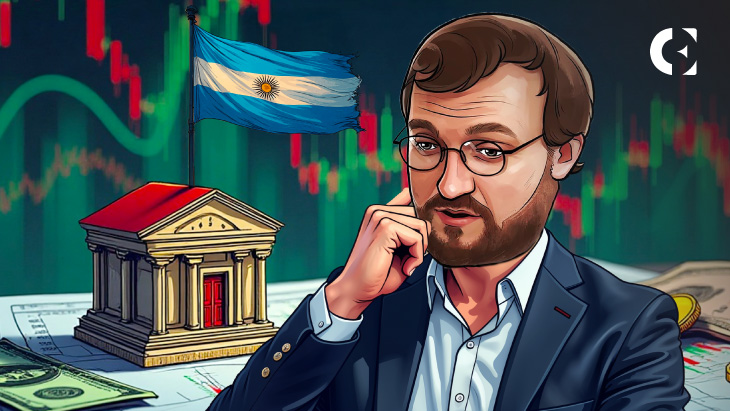- Cardano’s Charles Hoskinson, in Argentina, urges decentralization, “private money.”
- Hoskinson suggests Argentina “get rid of the central bank” amid high crypto adoption.
- He also eyes privacy-preserving stablecoins to mimic cash, notes $100B crypto in ARG.
Cardano co-founder Charles Hoskinson brought a bold message to Buenos Aires recently, pushing for decentralization and even suggesting Argentina could get rid of its central bank.
During an ideologically charged tour through the city, Hoskinson didn’t just see Argentina as another stop. He called it a symbol in the global crypto movement’s bigger philosophical fight. “I choose to go to countries that have freedom,” he said, according to a post by LibertarianWeb on X.
Hoskinson’s speech comes at a time when Argentina is reeling under chronic inflation and currency instability.
It’s a country where citizens already hold about $100 billion in crypto assets, a large slice of its roughly $700 billion national GDP. This highlights how many Argentinians are looking for financial options outside the usual banking system.
Related: ADA Under $0.74 as Exchange Outflows Resemble Pre-2021 Bull Run
A Call for “Private Money”: Hoskinson Suggests Argentina Ditch Central Bank
For Hoskinson, this is more than an economic statistic; it’s a harbinger of systemic change. “In five years, you can have private money,” he declared. But his vision comes with a controversial suggestion: “Just get rid of the central bank.”
Such a suggestion, while extreme for most conventional economists, often finds a receptive audience within many parts of the crypto community. To Hoskinson, Argentina serves as both a warning about the failures of centralized financial systems and a beacon of hope for what blockchain technology can offer. Investors losing trust in centralized firms has created a fertile ground for blockchain adoption.
With one of the highest per capita crypto adoption rates globally, Argentina demonstrates the kind of environment where Cardano’s long-term mission of replacing trust with code and centralized control with decentralized consent can thrive.
Privacy-Preserving Stablecoins to Mimic Cash
Hoskinson’s ambitions aren’t confined to national borders. Backed by Cardano’s expanding ecosystem, he’s eyeing a new frontier: privacy-preserving stablecoins. In a recent interview on eToro’s Conversations with Leaders podcast, he emphasized the growing demand for digital cash that doesn’t track every transaction on a public ledger.
“Maybe people don’t want to have a stablecoin where every time they buy something it’s forever tracked by everyone everywhere,”
While the stablecoin market is currently valued at around $243 billion, most of these coins operate on public blockchains like Ethereum and Solana, making their transaction histories open and easily traceable.
Related: Cardano Price Prediction for May 21: Will ADA Hold Above $0.73 Amid Growing Bear Pressure?
In contrast, Hoskinson envisions a stablecoin that mimics the privacy of physical cash–an idea that could redefine how people think about digital money and personal liberty.
Disclaimer: The information presented in this article is for informational and educational purposes only. The article does not constitute financial advice or advice of any kind. Coin Edition is not responsible for any losses incurred as a result of the utilization of content, products, or services mentioned. Readers are advised to exercise caution before taking any action related to the company.







